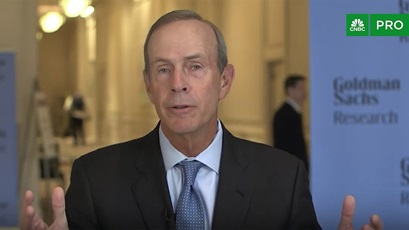emissions solutions
midstream VP: natural gas will continue to be important in lower carbon future
2 min read | march 16, 2023
Colin Parfitt speaking at CERAWeek 2023 in Houston.
A year after Russia’s invasion of Ukraine, Europe’s heightened energy crisis remained a dominant topic throughout CERAWeek 2023 in Houston, Texas.
“If you look at the world, there’s more demand and less supply because Russian gas is now shut in,” said Colin Parfitt, Chevron’s midstream vice president. “So how do you deal with that? You can create supply.”
Chevron, with its ample gas supplies in the Permian Basin and Eastern Mediterranean, is poised to be part of a long-term solution, thanks in no small part to natural gas.
“Natural gas has played a huge role in the carbon reduction story so far,” Parfitt said. “Fundamentally, switching from coal to natural gas has fueled lower emissions.”
quick take
At the conference, Parfitt discussed multiple pathways for natural gas in a lower carbon future and the importance of natural gas in providing affordable, reliable, ever-cleaner energy.
“Natural gas is a plentiful and reliable source of energy that will help address intermittency issues that we face with renewable resources such as wind and solar,” Parfitt said. “In moving toward a lower carbon future, reliability is key. Natural gas provides a lower carbon intensity alternative when the sun isn’t shining and the wind isn’t blowing.”
colin parfitt, vice president, midstream
why natural gas
Natural gas is the cleanest-burning conventional fuel, producing lower levels of greenhouse gas emissions than the heavier hydrocarbon fuels, like coal and oil. But according to Parfitt, those traditional energy sources will continue to play a role.
“Oil and gas will remain necessary as the world population grows and people aspire to a better standard of living,” Parfitt said. “Natural gas—liquified natural gas, specifically—presents an opportunity to reduce emissions in many sectors today.”
Liquified natural gas presents a specific opportunity to reduce emissions because we can move large volumes of it in a compressed state. The result: transporting more product with less freight and lower environmental impact.
The advantages of natural gas include its efficiency, abundance and versatility. Historically, natural gas also has been one of the most economical energy sources.
“Chevron is a global player in the natural gas market,” Parfitt added. “The carbon intensity of our energy production is top quartile performance, meaning we are among the least carbon-intensive producers.”
Paired with other lower carbon offerings, natural gas will be part of the long-term energy mix, Parfitt said.
by the numbers
Chevron will invest $10 billion in new energies and carbon reduction opportunities through 2030. And by 2040, U.S. households are on track to save an aggregate $100 billion—roughly $655 per household per year—thanks to the rising use of natural gas.
“The whole challenge is how to supply lower carbon energy to a growing world,” Parfitt said. “We’re working to decarbonize existing value chains, and natural gas is going to be a huge part of that.”
topics covered
related content
-

 chevron CEO discusses the future of energy
chevron CEO discusses the future of energyemissions solutionsjanuary 20, 2025
-

 novel ideas, established companies key to advancing lower carbon tech
novel ideas, established companies key to advancing lower carbon techemissions solutionsjanuary 14, 2025
-

 chevron CEO talks growing production, efficient spending
chevron CEO talks growing production, efficient spendingemissions solutionsdecember 18, 2024
-

 1st US hydrogen-powered passenger ferry open for business
1st US hydrogen-powered passenger ferry open for businessalternative fuelsaugust 23, 2024
chevron email updates
Subscribe to our newsletter to receive news and updates.



